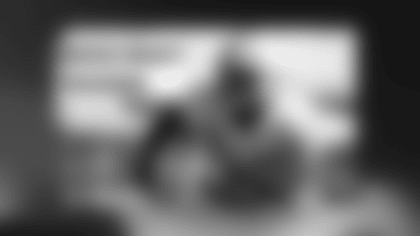HEAD COACH BILL BELICHICK
Conference Call
Tuesday, December 3, 2019
Q: What are the similarities, if any, between the Chiefs and Texans?
BB: Yeah, I mean, Mike [Petraglia], we don't really look at it that way. So, I think what we would try to do is look at the Chiefs and kind of what we need to do against them. At that point, relate that to what did most recently against Houston, and then say, "OK, do we need to change this, or can we just keep it the same?" Or, can we take something that we did last week and make it close enough to what it needs to be for Kansas City so that we have as little disruption as possible, or have as much carryover as possible? Sometimes, you don't want to have too much carryover because you don't want it to look exactly the same as what it looked like last week, so that's what Kansas City's looking at. So, it's really not about trying to make Kansas City the same as Houston; it's look at Kansas City as Kansas City and then if there is an opportunity to do things that were similar to last week with Houston for continuity's sake, that's one thing. But if they're not, then we just have to change it to fit the Chiefs.
Q: Is the reverse of that true, where you can't assume that Kansas City will see what Houston did and coach that way? Can you out-think it if you assume that's what they're doing?
BB: Well, yeah. I think Kansas City has enough breadth to their offense to – look, they've seen everything. They've seen man, they've seen zone, they've seen different types of man, different types of zone, different types of blitzes, different fronts. You know, there's a certain type of fundamental way that they would attack any of those, and I think if they know where you're going to be, they're probably going to have something pretty good against it. So, you don't always want to just line up and tell them, "Look, this is what we're in, and let's see what you want to do about it," because they're probably going to have a good scheme or a good matchup that's going to cause you a problem. So, somewhere along the line, you're going to have to disguise and make them figure it out. There's a point where you might just have to line up and play it, and maybe they know what you're in, but I don't think you want to do that the whole game and just let them tee-off on you. And they're not going to do the same thing either. They're not just going to give you a couple looks and say, "Here we are." They'll run complementary plays, complementary formations and personnel groups that even if it is the same play, it'll look differently, or it'll look like it's the same play, but it'll have a misdirection or a counter element to it that if you're over-playing one thing, then you can't stop the other one. So, that's just what they do. They're very good at it. They have a lot of complimentary plays. If you're stopping one thing, you're probably a little light on something else, and it's hard to stop everything. It's hard to stop the different elements that they have. Within one basic concept, they have two or three things that off-shoot, and then you go to another concept with another set of off-shoots, and that's just – the multiples are a lot. And they're good at it, and they have a lot of good players. So, it's all one big challenge with the Chiefs. It isn't like just stopping one guy, or trying to stop one play, or one formation or anything like that. There's enough of everything that you've got to work on it all, and sometimes it runs together. And again, they eventually find mismatches and ways they can puncture you.
Q: You don't currently have a kicker on the roster. What is the plan between now and Sunday? Do you plan on bringing back Nick Folk?
BB: Well, we have a few days to work that out. So, we'll look at our options and try to do what we feel like is best for the team based on what our options are. So, I don't know exactly how that's going to go, but we'll see.
Q: How does the team deal with logistics on snowy days like this, and how much do you make it clear to the players that there's no excuses for getting to the stadium and practice when there's a couple feet of snow outside?
BB: Well, first of all, the players aren't in today. Today's a rehab day and a player day off and that type of thing. So, we don't really have to worry about the specifics of today. But, I would just say in general, any time you're working with a large group of people like we are, and we're all dependent on each other, we just can't all come in and work whenever we feel like it, and [inaudible] and do our thing without interacting without everybody else. It just wouldn't work. We just can't operate that way. So, we have to find a way – in whatever the circumstances are – we have to find a way that we can all work together, so that we can communicate our ideas and our plans, and get feedback and have the interaction with all the players, coaches and teammates and so forth, in order to prepare for a team competition. So, whatever we can do to facilitate that, then that's what we do, and that encompasses a lot of different things, a lot of different logistics. So, weather could be a challenge, then based on what the circumstances are, and what day it is, and what we're doing and so forth, and we try to have a plan to maximize what we need to do in the circumstances that we have to work around or work with. So, I know that doesn't specifically answer your question about today, but we're not dealing with today. So, if something happened tomorrow, it would depend on what the circumstances were, but ultimately that's our goal is to try to be able to get our team to prepare for our competition, and we do whatever we need to do to do that. Maybe it's stay on schedule, maybe it's modify the schedule. It could be a number of different things, it would just depend on the individual situation at that particular time.
Q: How much was having Jake Bailey handle kicking responsibilities part of the conversation last week? Did you look at that as a possibility?
BB: Yeah, we've looked at a number of different options. And again, last week was last week, this week's this week, and maybe it'll be the same, maybe it'll be different and maybe some of the circumstances around that will change. That situation came up pretty late in the week, so this week we have a little more time to plan and evaluate the entire situation, and again, we'll see what our options are and try to make the best one.
Q: Yesterday you claimed Albert Huggins off of waivers. What type of player is he?
BB: Well, he's obviously a young player, a rookie player – a guy that we evaluated last year in the draft out of Clemson. He's a pretty big kid, 6-3ish, somewhere in that ballpark, over 300 pounds. He's had a little bit of playing time for Philadelphia, was with Houston earlier in the year. So, we've had a couple different looks at him. We only had five defensive linemen on our roster and he was on waivers, so we'll take a look at it, see how it goes. I don't know.
Q: You've talked about second-down passing being an issue against Houston. We've talked about third-down passing before, but is there anything specific to second-down that makes it a challenge?
BB: Well, sure. First of all, the offense has more options. They have two downs instead of one. On third down – unless you're in a fourth-down situation, which that's another longer conversation, but plenty of teams do that, too. But putting that aside for a moment, third-down's really a one-down situation, whereas second-down, you have two downs left. It was an area we didn't do a very good job of against Houston. Honestly, it wasn't that great against Kansas City last year either in the playoff game. So, that's something we have to do a better job of coaching and executing. We all have to do a better job in that area.
Q: As a defense, do you have more options on second down as well?
BB: Yeah. I mean, they can do whatever they want. They can run, they can throw short, if they complete a 10-yard pass, then they pick up the first down on second down, and there is no third down. So, if they pick of 5 yards on third-and-8, it's a different story than picking up 5 yards on second-and-8. So, just defensively, you have more things to defend, more things to worry about. And third down, I would say, is more – it's a one-play situation. I don't think the offense has as many options. I mean, they can call whatever play they want, I understand that. That's what offenses do, they can run whatever they want to run. But, defensively there's an advantage to knowing on one play you have to defend X amount of yards with whatever personnel group they put on the field, and I think there's usually some things you can eliminate and say, "Well, they're probably not going to…" The percentages are, based on the team that they have and so forth, that there are some things you can definitely eliminate, or have a very high percentage of eliminating in that situation. On second down, there's probably a few things you could eliminate, but not nearly as many. You just have to defend a lot more, and as I said in our case, we just need to do a better job of it. We need to coach it better and we need to play it better.
Q: How much have you seen Patrick Mahomes mature this year? He says he's taking what the defense is giving him and not forcing things as much this year.
BB: He' obviously a great player, has a lot of skill. Terrific arm and very athletic kid. So, he would be better suited to answer that than I would. I don't really know what he's being told on each particular play and know where he should go, or whether the read is from A-to-B, or B-to-A, or C-to-B – I just, I don't know that for sure. So, his decision-making and so forth, it's hard to evaluate that unless you're coaching the player, and you know what he's being told to do and you know the progression that he's following. So, it'd be hard for me to comment on that, but I would say that he's a great player. He spreads the ball around, he gets it to everybody, they have a lot of explosive plays, they have a lot of explosive players. But, his job really is to get to get the ball to the explosive players so that they can do something with it, and he does a very good job of that. So, he's got excellent vision, accuracy, and when the defense doesn't defend the play well or properly, then he's usually able to take advantage of it. So, I would say his vision and his execution and accuracy are all very good and that enables him to do that. But, as far as he feels like he's matured or is reading better and so forth, that'd be hard for me to really evaluate that. But, I'm sure if that's the way he feels, it's probably true.
Q: How did you feel James Ferentz played in relief of Ted Karras against Houston? Also, cameras caught you talking with Dante Scarnecchia when Ferentz came into the game. How do you communicate with Dante about offensive line play when something like that happens during a game?
BB: Yeah, I don't think our conversation at that time had anything to do with James Ferentz. So, that was just kind of coincidental. James, again, has a lot of experience even though he doesn't have a lot of playing time, but he has a lot of experience. He's played a lot of football, he's practiced a lot of football. He's been with us for a long time, he knows our offense and all the things that go with it – the line calls, the cadence and so forth – extremely well. He's one of the hardest working players on the team, is very dependable. He's tough, he communicates well on the offensive line to direct traffic as David Andrews and Ted also do, so we're very fortunate that we have had multiple people that can do that, and that's a key part of that position. But, another key part is obviously you have to block somebody on every play. There's no plays that the center's not involved in the blocking. Whether it's run or pass, you can't run away from the center; he's right in the middle of the play. So, his instincts and awareness and playing strength and, I would say, experience – even though it's not all in-game experience – are all positives. He does a great job for us every day, and he's backed up Andrews and he's backed up Karras, and when you put him in there in practice, it's pretty seamless. But, he's done a great job of helping our defense prepare for our opposing offense and their operation, cadence, snap-counts, mike-points, line-of-scrimmage communication and so forth. And he's done a great job of that and has been recognized multiple times by our staff for the look he's given us in practice and the way he's helped our defense prepare. But, certainly gives us a lot of confidence when he goes in there that he knows what he's doing, and we can depend on him, and that's a very valuable thing. You hope you don't need it, but we do now and I'm glad we have him.
OFFENSIVE COORDINATOR JOSH McDANIELS
Conference Call
Tuesday, December 3, 2019
Q: Recently when closer to the goal line, you guys have been willing to throw it more than run it. Is that based on the looks you're getting from defenses? Is it based on what your team is good at at this time?
JM: I think it's always a function of the way you get played and what you have confidence in. To me, there's times we go into a situation where we have more than one call available to us and we're trying to get to the best one. There's times where we just go ahead and make a call and live with it. And then there's certainly situations like the other night where you get in a third-and-goal situation and you're most likely going to throw in those scenarios, regardless of what the defense does. It's my responsibility to put us in good positions to be successful down there, and I want to make sure I do the best job I can to give our guys the best chance to score because that's ultimately the reason why we're on the field. The other night I thought Houston made a good play on the first drive down in there, in the red zone. We ran the ball, I want to say it was maybe first-and-goal at the seven, and the safety tackled us near the line of scrimmage. He was in the back field and that's the way we were getting played, quite honestly. Down there against them and a few other teams the last so many weeks here, where they're trying to make it difficult, trying to force you to do something, be one-dimensional. We still have to find ways to be able to stay balanced, run it in if we're doing well in the running game, which we were on that first drive, and try to find a way to get it in on the ground if we can – and also, at the same time, be productive throwing the ball, too. I know we had a couple situations down there in the game where we were behind and you're throwing a little bit more than running in those scenarios normally anyway. Our goal is to always try to be as efficient as we can be and do the thing that gives us the best chance to have success. I certainly am not opposed to being more run than pass or more pass than run if it's going to be successful for our team. I've got to do a better job at trying to find the right answers each week and put our guys in the right position and hope that we can go out there and execute well and get it in the end zone each time we're down there.
Q: Do you feel like offensively you have enough things to do well to be the kind of offense that you want to be?
JM: I think there's a lot of things that you could look at that you could say we could improve on. Certainly, that's the truth. I think it's been the truth most seasons that I've ever coached. But, at the end of the day, there are certain things that we have to do well in order to give our team the best chance to be successful, some of which we've done decent throughout the course of the year and some of which we certainly need to do better. Taking care of the football has historically been a thing we've done well and certainly is a big factor to winning and losing. The other night the one turnover seemed to really flip the game a little bit there in the first half. But we've done that decent and we have to continue to do that well – certainly that's going to be a huge factor in this game this week against Kansas City. Protecting the quarterback and not going backwards in the running game and trying to stay out of long-yardage situations to improve your chances on third down – which there were times the other day when we were pretty good in that area. We tried to keep it in third-and-manageable and actually converted a decent chunk of third downs the other day, too. I think the bottom line is you have to feel like you have an opportunity to improve in each area at practice each week, and each week's a new challenge. We certainly want to try to take care of the ball, we certainly want to try to keep the ball moving forward, we certainly want to improve on third down and in the red zone, two-minute offense, those situational plays that can certainly change the outcome of a drive or a quarter or the half or the game. I start with me. I can do a better job of trying to do that and that's what my focus is on, and hopefully we can make some strides and improve in a lot of areas this week, as well.
Q: Over the last two weeks you guys have been able to pull off some longer runs. What do you think has led to that? What has Isaiah Wynn's return to the line meant in that respect?
JM: The running game is never one thing. You can never just count on one person to make that go; it's really a team play. Each time you call a run play, you need a lot of people to do their job pretty well and be physical, and it includes the receivers, the tight ends, the line, the back doing things right. We work really hard each week on that area of our team because we know how important it is, especially here in New England. As we get closer to the end of the year and we're playing in December, weather is going to be a factor and those types of things. All in all, I think our guys have done a pretty good job of being diligent about their assignments, trying to play physical. I think we're getting more – there's more repetitions with Matt LaCosse, Ben Watson, the tackles, the guys inside. Teddy Karras has played now for a number of months, Isaiah's back, and timing, combination blocks, double teams, those things are things that improve with practice, repetition and good habits. Hopefully our best football in every phase is in front of us, but I feel like we've made some progress in the running game, and we need to continue to do that as we head into the last four games of our season.
Q: What do you try to do to bring Tom Brady and the young receivers together and make it easier for both sides to be productive?
JM: I don't think there's any shortcut to being on the same page, in terms of anticipating what the other person is thinking, feeling and seeing. A lot is made of somebody thinking one thing and somebody else thinking something else. I think there's a lot of factors in the passing game that would determine what being on the same page really means, but practice, repetition – there's no shortcut to it. Every rep we take in practice, every pass we throw, every side session that we're able to take part in, every conversation, every one-on-one drill that we do in practice, every film session that we're in, it just continues to try to build off of the last one. I think patience is something that – I know everybody wants everything to be a finished product, and we do too, but at the same time you have to understand there's going to be a process and we're going to try to stick to it. We have to be committed to it, and we know that it's productive when we stay the course and continue to coach the right things and fix the right things and then the players go out and make corrections and they have success with it. Once they make the corrections and have success with it, they gain confidence in it and they start to trust each other more, and there's no shortcut to that. I think our guys are trying really hard. I have absolutely zero issue with our effort and the desire to do it right, and I think that that's what everybody is working towards. I love the attitude that our guys take into each practice and each opportunity to get better. Each game is the same way – we go into the game, we do some things well, we do some things that we have to fix and try to learn from, and hopefully we can do those better the next week. That's football. Football is an imperfect game. Hopefully we're trying to make those corrections and make strides each week. I know our players are working their butt off to try to do that. I know that the quarterbacks and the receivers, quarterbacks and the tight ends, quarterbacks and the running backs – again, there's a lot that goes into being productive in those areas – timing, anticipation, reading things the same way, adjusting if you need to. A lot of things are improved through repetition and practice. If we can create good habits and have those experiences that we can build on, then I think we'll be better for it down the road. Everybody's looking for the same thing, everybody wants the same goal at the end of the day – it's for us to be the most productive we can be and the most efficient we can be in the passing game.
Q: How early in the process of play calling do you need to figure out what play you're going to call? Is it while the previous play is happening? How early do you need to make the decision and how quickly do you need to get it transmitted to the quarterback?
JM: That's a great question. It's probably multi-faceted in the answer. There's certain things you're trying to set up as you go through the game. You may call a couple things early in the game to try to build on that and call something different as you go forward. There may be something you are kind of paying attention to relative to personnel or down and distance or something that you've studied that you're waiting on to try to go ahead and make the call at the right time. I would say on a play-to-play basis, as soon as you make a play call and it goes in to the quarterback, you're really focusing on the potential outcomes on that play and what you may be thinking on the next one based on what the down and distance and field position is going to be. If it's a second-and-4 call and you make the call, you're hopefully thinking okay third-and-1 to 4 or first-and-10. You're trying to make sure you got one eye on what you may be calling if it's third-and-short and one eye on what you may be calling if you get a first down and you have a new set of downs in front of you. Usually, the play is called within 10 seconds of the previous play being run and finished, sometimes maybe a few seconds after that. Generally speaking, I would say you want to try to get it in as early as you can because you have to substitute personnel sometimes, they've got to get in the huddle, they've got to hear the play call, the cadence, et cetera and then try to break the huddle with plenty of time on the play clock to do whatever the call requires from the quarterback, whether that's motion, shift, et cetera. There's a lot of things that can go into what you want to call at each time and you're trying to process that as you go. There's also, every once in a while, there's the thing like the other night – you get a good play and then there's a penalty that puts you in a different set of circumstances and then you've got to try to recalibrate as quickly as you can and get yourself into a mode of trying to get those yards back that you lost. A lot of things that are happening in a quick amount of time – hopefully you get it in as quickly as possible. That's the best thing for the players so that they have the maximum amount of time to do the right thing at the line of scrimmage.
Q: Where does this Chiefs defense present some of the biggest challenges for you? Do you look at these "NFL Next Gen Stats," like how fast guys are? Do you use those for any part of your preparation?
JM: I can answer the last one first. The only time – you see those every once in a while flash on the scoreboard or something, or if you happen to catch a TV game or something like that. But, generally speaking, I'm not – we don't have a lot of the miles-per-hour stuff factor into what we're doing. The Chiefs defense, the first thing I'd say is this is a new scheme for us. We've played the Chiefs for a number of years in a row now and this is obviously a scheme change for us. Coach [Steve] Spagnuolo, who I coached with in St. Louis for one year, he's really a good football coach. They challenge you in a lot of different ways. It's a one-gap scheme where they try to disrupt you with some penetration and they pressure on all three downs, which is a challenge. They'll try to challenge your protections and force the ball out maybe before you want it to come out with their blitz packages. Very creative in that regard. I've had a ton of respect for the way that they do that, for years now. Really a good team in short yardage, very good in third-and-medium scenario where they excel and they can get after the quarterback. To create disruptive plays they have guys in the front, [Frank] Clark, [Chris] Jones, [Alex] Okafor – those guys can really get in the backfield and create some disruption in the running game. Certainly, all of them have some production rushing the passer and creating long-yardage situations. It starts there. You've got to do a good job with their front and try to hang in there and avoid negative plays. You've got to be able to handle the pressures. I think they do a really good job of disguising. [Tyrann] Mathieu, I've had a tremendous amount of respect and admiration for him since he's come in the league. He's always a difficult player to play against. He lines up in a lot of different spots, he plays a lot of different identities in their defense, disguises what he's going to do, where he's going to be and you've got to be really conscious of him. The last thing I'll say is they do a pretty good job in the red zone. If you move it between the 20s, you've still got to really hunker down and play some of your best football inside the 20-yard line, where they're pretty damn good. Big challenge ahead of us, new scheme. Some players we're familiar with, some we're not. They have some new faces in there certainly and we're going to need to get used to the players and the way they play and the things they do on all three downs and in those situations that I talked about because we've got to play a great complementary game this week. We know how talented this team is. They're very good in all three areas. We're going to need to play one of our best games of the season on Sunday here in Foxborough.
OUTSIDE LINEBACKERS COACH DEMARCUS COVINGTON
Conference Call
Tuesday, December 3, 2019
Q: How aware are you of speed on the outside with the Chiefs offense?
DC: They have very explosive players, so this team, what they've built off of is explosive skill players. It's a dynamic team who can score on any given down, so that's definitely one of our points for this week is knowing their personnel, which is explosive skill players.
Q: How do edge players approach trying to get after a mobile quarterback? Is there a different approach when going after a quarterback when he has that athletic ability like Lamar Jackson, as opposed to a more conventional pocket passer like Philip Rivers?
DC: It's a combination of things of where you study throughout the week – quarterback, to O-line, to protections, to everything. It really starts with, against any quarterback, rushing as a unit and being disciplined within the rush. So, it doesn't matter if you face Patrick Mahomes to Philip Rivers to [Tom] Brady] – if you're undisciplined in the rush or you're not rushing as a unit, anybody can hurt you. So, every week, we always talk about being disciplined, rushing aggressively but under control, and knowing that we can rush as a unit. When we rush as a unit, it works well for us.
Q: The defensive backs coaches said that their position groups have been meeting together quite a bit because there is so much overlap and guys are versatile with playing multiple roles. How much are your and Jerod Mayo's groups of outside and inside linebackers meeting together?
DC: I would say, just like you're saying, that there's overlap within the two positions at some things that we do. So, there's times that we do meet together. There's times that we don't meet together where we have to focus in and zone in on each position that we have to handle for the game. So, I think it's a good mix between the two of meeting together when we need to meet together and meeting separate when we have to meet separately to get what we need done for that game and make sure we get the proper coaching points done for that game. We'll meet separate or together.
Q: Did the flu bug affect the way you rotated the linebacking corps in this past game? Jamie Collins and Kyle Van Noy both had lower snap counts than what we typically see from them.
DC: Right, well, one of the things I would say, our guys are tough guys, competitive guys. So, holding those guys back – it's hard to hold those guys back from anything because of the way – how such competitors they are. I would say we've got a lot of good positional depth that allow us to rotate a lot where we have a lot of smart guys who know what they're doing, who can go in and play, whether it's to start or come as a backup or rotationally. We have a lot of guys that we can depend on to stick in there and not miss a beat. That's the one thing that we're fortunate about that we can rotate and still get high level production and high level play out of the guys.
Q: When an outside linebacker has to run with a running back, how can those guys use leverage and their positioning to help keep those smaller players in check in the passing game? It feels like that's a pretty tough challenge physically for linebackers to keep with those guys in the open field.
DC: Well, you see that done all over the league. You see that in high school, college and NFL that guys on the line of scrimmage cover guys in the backfield, cover guys all over. So, you see it done. It's just we've got to coach it better, we've got to work on the fundamentals and techniques of it. It can be done, we've just got to do a better job of coaching it up and got to do a better job of executing it in the game. So, those are things that happen all over the league that people do it from off the ball, on the ball. They do those type of things in coverage – which, is it the easiest thing? It's not the easiest thing; it's not the hardest thing, either. It's just all about coaching it up the right way and playing it the right way with the proper fundamentals and technique.






































